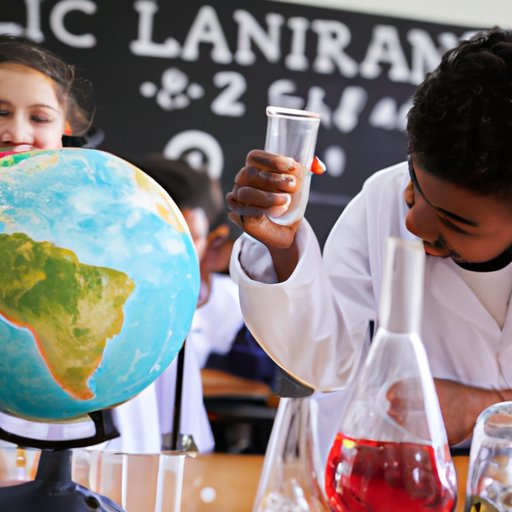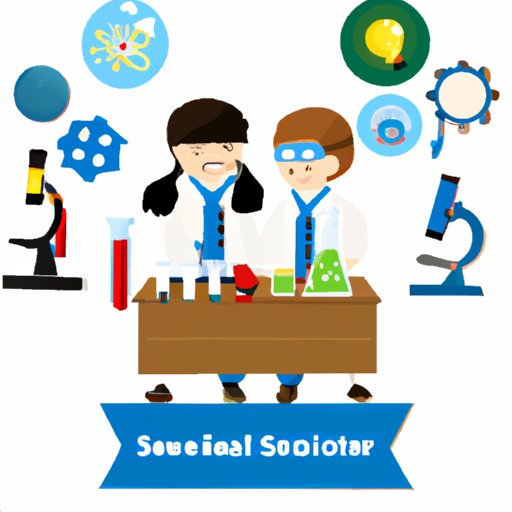Introduction
Science is a broad field that encompasses a variety of disciplines, from biology and chemistry to physics and engineering. It is an integral part of the educational experience, providing students with the knowledge and skills they need to succeed in their academic and professional lives. In this article, we’ll explore why science is so important in school and discuss the various benefits it can provide to students.
Role of Science in Providing Students with Critical Thinking and Problem-Solving Skills
Critical thinking is an invaluable skill that all students should be equipped with in order to make informed decisions and solve problems. Science can help students develop these skills by encouraging them to think critically and ask questions. Through experimentation, observation, and inquiry, students learn to evaluate evidence, analyze data, and form conclusions.
For example, when conducting an experiment, students are encouraged to consider the variables that could affect the outcome and how to control for them. They must also consider the potential sources of error or bias and how to minimize them. By engaging in this type of problem-solving, students gain a better understanding of the scientific method and how to apply it in real-world situations.
In addition, scientific inquiry encourages students to think beyond the facts and figures. As noted by Dr. Kenneth R. Miller, professor of Biology at Brown University, “Science is a way of asking questions about the natural world, and then using what we learn to construct testable explanations and predictions.” By engaging in this type of questioning, students are able to gain a deeper understanding of their environment and the world around them.

How Science Can Help Students Understand the World Around Them
Scientific knowledge can be applied to a wide range of everyday situations. From predicting the weather to understanding the impact of human activities on the environment, science can help students make sense of the world around them. For example, students can use their knowledge of chemistry to understand how different substances interact with each other and how changes in temperature or pressure can affect their properties.
In addition, students can use their knowledge of physics to understand the principles of motion and how forces like gravity and friction work. With this understanding, students can develop a greater appreciation for the laws of nature and the beauty of the world around them.
Showcasing Science’s Ability to Generate Interest in Other Subjects
Science is an incredibly interdisciplinary subject. It has the ability to generate interest in a wide range of subjects, from mathematics and technology to art and music. For example, students can use mathematical equations to calculate the trajectory of a projectile or use computer programming to model complex systems. In addition, students can use their knowledge of biology to explore the evolution of life on Earth or use their understanding of chemistry to create works of art.
Furthermore, science can be used to teach other subjects. For instance, students can use their knowledge of physics to gain a better understanding of energy and its role in climate change. By exploring the concepts of kinetic and potential energy, students can gain a better appreciation for the importance of renewable energy sources and the impact of human activities on the environment.

Detailing the Relevance of Scientific Knowledge in Everyday Life
Scientific knowledge can be used to make informed decisions in everyday life. From understanding the nutritional value of different foods to determining the best way to conserve energy, scientific knowledge can help us make better choices in our day-to-day lives. For example, students can use their knowledge of biology to understand the health benefits of different foods and how to maintain a balanced diet. In addition, students can use their knowledge of chemistry to understand the effects of pollutants on the environment and how to reduce their carbon footprint.
Furthermore, scientific knowledge can be used to develop new technologies and products. For instance, students can use their knowledge of physics to design more efficient solar panels or use their understanding of chemistry to develop new materials that are more durable and eco-friendly.
Demonstrating the Value of Science in Preparing Students for Future Careers
Science provides students with the necessary skills and knowledge to pursue a wide range of career paths. From engineering and medicine to research and education, science can open the door to many exciting opportunities. For example, students who have a strong foundation in biology can pursue a career as a medical doctor or researcher. In addition, students who have a good understanding of chemistry can pursue a career as an engineer or chemist.
In addition, science can provide students with the necessary skills to succeed in the modern workplace. For instance, students who study physics can develop the problem-solving skills needed to tackle complex tasks. Furthermore, students who study chemistry can develop the analytical skills needed to make informed decisions.

Emphasizing the Importance of Scientific Inquiry in Advancing Human Progress
Scientific inquiry is a key component of scientific progress. By asking questions and testing hypotheses, scientists are able to uncover new information about the universe and how it works. From understanding the structure of atoms to discovering the cause of diseases, scientific inquiry has allowed us to make incredible strides in advancing human progress.
For example, by studying the structure of DNA, scientists were able to identify the genetic code responsible for inherited traits. In addition, by analyzing the fossil record, scientists were able to uncover the evolutionary history of life on Earth. Through scientific inquiry, we can gain a better understanding of the world around us and use this knowledge to improve our lives.
Describing Science’s Role in Providing a Platform for Collaboration and Teamwork
Science can also provide a platform for collaboration and teamwork. By working together, scientists are able to pool their resources and share their knowledge to develop innovative solutions to complex problems. For example, teams of scientists can work together to develop new treatments for diseases or create new technologies to address environmental issues.
In addition, collaboration and teamwork can help foster creativity and innovation. By working together, scientists can brainstorm ideas, challenge each other’s assumptions, and come up with creative solutions to difficult problems. Through collaboration and teamwork, students can gain a better understanding of the scientific process and how to work effectively with others.
Conclusion
Science plays an essential role in the academic development of students. It provides them with the knowledge and skills they need to succeed in their academic and professional lives. From providing students with critical thinking and problem-solving skills to demonstrating the relevance of scientific knowledge in everyday life, science can help students gain a better understanding of their environment and the world around them. In addition, science can prepare students for future careers and provide a platform for collaboration and teamwork. Ultimately, science is an invaluable tool that can help students reach their fullest potential.
(Note: Is this article not meeting your expectations? Do you have knowledge or insights to share? Unlock new opportunities and expand your reach by joining our authors team. Click Registration to join us and share your expertise with our readers.)
